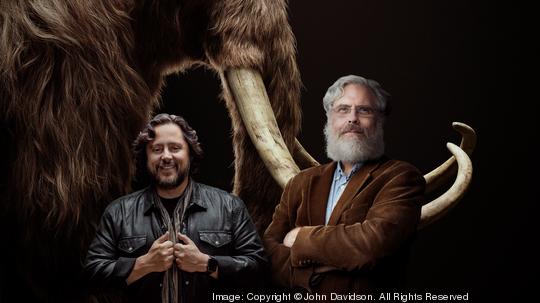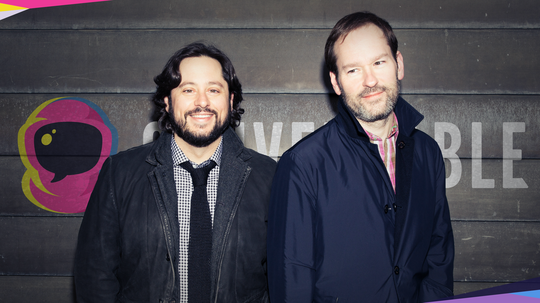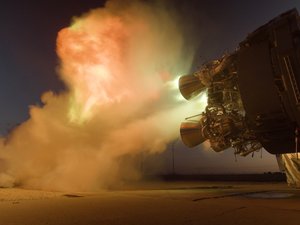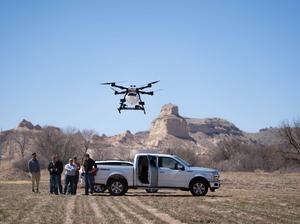
A couple years ago, while in the midst of building his fifth startup, Ben Lamm read an article by Harvard's Dr. George Church about the possibility of bringing the woolly mammoth back from extinction.
Lamm had been following Church's work for nearly a decade, but this breakthrough stuck with him.
"As I dug deeper and deeper down the rabbit hole, I learned about this concept of species extension," he said. "So if you look at the loss of biodiversity in this kind of terrible tragedy that's upon us with manmade climate change, one of the things that sticks out is that between now and 2050 we're gonna lose 50% of biodiversity."
Lamm, who is outspoken about the perils of climate change, began to see an opportunity to start a new company – one that he felt could be altruistic, but also has the strong potential to spin off new technologies that can be monetized.
With that, Colossal was born. But it has operated mostly in stealth over the past two years.
Now, after hiring a team of experienced technologists and raising $15 million in venture funding, Colossal is stepping into public view and sharing its ambitious plans. Lamm said the young company is four to six years away from birthing its first group of mammoth calfs. About 18 months of that is for gestation in artificial wombs. Once born, the animals reach sexual maturity in about 13 years, allowing them to further populate in arctic regions such as Canada and Siberia.
While the gene-edited animals will have many of the mammoth's key characteristics, such as its coat of long hair, it will essentially be a new species, derived from Asian elephants and mammoth DNA. Their DNA is nearly identical -- 99.96%. It's the cold tolerant genes from the mammoth, which went extinct about 10,500 years ago, that are key to the new mammoth's future and nursing arctic grasslands. And saving grasslands plays a role in carbon sequestering, methane suppression and light reflection that impact climate change.
Colossal's plans also come as urbanization continues to decimate Asian elephant populations, which have declined by 50% over the past three generations.
"The idea of Arctic re-wilding is very interesting," Lamm said. "The idea of taking these technologies and leveraging them for critically endangered species is interesting ... so, for me, it was easy to fall in love with."

Colossal's 19-person team is split between Austin, where it develops software and hardware; Boston, where its biology work is based at Harvard; and Dallas, where its commercialization for biomedical and other industries will occur.
Dr. Church, who is the Robert Winthrop Professor of Genetics at Harvard Medical School, is leading the science team using CRISPR and other gene-editing technologies. Through a licensing agreement with the Harvard Office of Technology Development, Colossal will support research in Church’s lab aiming to create the elephant-mammoth hybrids and commercialize the tech.
Colossal is not the first organization to set goals of bringing back the woolly mammoth. The species' genetics have been known since at least 2015, and Church has spent more than a decade on the complex process of bringing them back.
What's new, in addition to advanced gene-editing methods, is Colossal's venture funding and the tech team it has assembled.
Lamm said he was very selective in pitching the company to venture capitalists. He found a lead investor in Thomas Tull, a billionaire businessman who is CEO of Tulco LLC, former CEO of Legendary Entertainment and a film producer on major Hollywood releases, such as "Inception" and "The Dark Knight." Other investors include Breyer Capital, Draper Associates, Animal Capital, At One Ventures, Jazz Ventures, Jeff Wilke, Bold Capital, Global Space Ventures, Climate Capital, Winklevoss Capital, Liquid2 Ventures, Capital Factory, Tony Robbins and First Light Capital.
Colossal's co-founders include Lamm and Church, as well as Chief Product Officer Andrew Busey, who previously co-founded Hypergiant, Conversable and Chaotic Moon with Lamm and others; Chief Operating Officer Kent Wakeford, who co-founded Integral Ad Science; Chief Legal Officer Brian Beard, a former managing partner of Wilson Sonsini Goodrich Rosati LLP; Chief Business Officer Peter Phillips, a former executive of Interactive & Distribution at Marvel Entertainment; and Head of Biological Sciences Eriona Hysolli, a former postdoctoral fellow in the Church Lab.
The startup also has high-profile scientific advisors, as well as an executive advisory board that includes game developer, space traveler and Austin resident Richard Garriott.
Lamm said he thinks Colossal is akin to the Apollo Mission, in that it's a type of moonshot that involves development of multiple concepts that could be key to spinoff ideas that one day become core technologies.
"I think that, fast forwarding 10 years from now, hopefully there's a bunch of interesting technology spinouts that are monetizable that people are excited about that transform the industry," he said. "I think that we can apply the lessons learned of this de-extinction toolkit.. and then artificial wombs to two additional conservation aspects. I think we'll probably start looking at additional species that we can apply that whole concept of species extension to."
Editor's note: This story has been updated to clarify Thomas Tull's career history.






